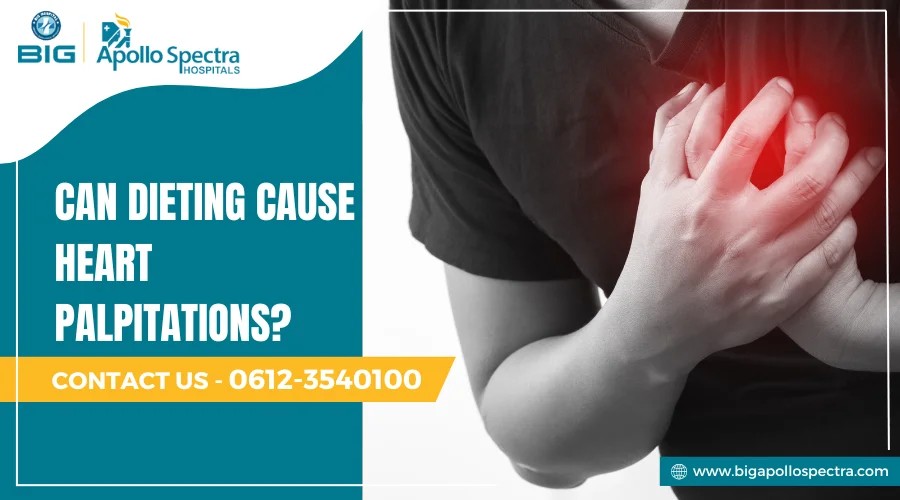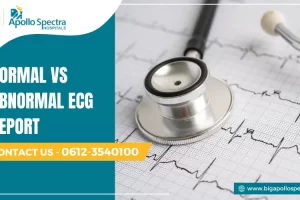The sensation of heart fluttering after skipping meals or beginning a new diet likely indicates something beyond normal hunger sensations. Heart palpitations, which occur when your heart appears to skip beats or start pounding rapidly, may cause distress and can indicate potential health problems.
Although cardiac irregularities usually occur due to stress or overexercise, they show an unexpected relationship with our dietary patterns as well.
The rise in extreme dieting trends has led to more people experiencing heart palpitations from not eating enough. Millions of people start dieting without knowledge about its possible consequences on heart health, so understanding this connection is critical.
Can Dieting Cause Heart Palpitations?
The steady function of your heart requires the proper balance of nutrients and electrolytes along with adequate fuel. If dieting alters the nutritional balance, the heart might respond with irregularities. Experts believe that eating less can cause heart palpitations because of disrupted nutrient balance.
The connection between dietary habits and heart palpitations demonstrates complex interrelated factors. Drastic changes to your eating habits trigger substantial metabolic transformations in your body. The heart’s electrical activity, blood volume, and hormone concentrations may be impacted by these physiological changes.
Common reasons for dieting-related heart palpitations include:
1. Electrolyte Imbalances
Electrolyte imbalances that occur during dieting disrupt the electrical signals which control your heart’s rhythm. Electrolytes function like your body’s electrical conductors because their levels changing due to limited food intake or extreme sweating makes your heart rhythm irregular.
Furthermore, potassium ensures proper heart function, and its depletion from aggressive dieting leads to palpitations.
The lack of magnesium in dietary plans frequently goes unnoticed yet it increases heart sensitivity to stress and the vulnerability to irregular beats. The following factors show how electrolyte imbalance can negatively impact heart health:
- Severe calorie restriction
- Rapid fluid loss
- Mineral deficiencies (particularly potassium and magnesium)
So, fixing the electrolyte imbalances should be the first course of action. However, there’s a high chance that you won’t be able to assess electrolyte imbalance or mineral deficiency on your own.
That’s why it’s best to consult a doctor. Moreover, experiencing heart palpitations on a regular basis should be a reason to seek medical attention from the best heart specialist in Patna.
2. Blood Sugar Fluctuations
The hormone responses triggered by blood sugar changes during dieting directly alter your heart rate. Your body releases stress hormones including adrenaline and cortisol to maintain energy levels when blood glucose levels decrease too much.
This hormone release from your body can trigger heart racing or irregular heartbeats. There are several primary reasons that cause blood sugar levels to change:
- Extreme low-carb diets
- Irregular eating patterns
- Fasting periods
Restrictive diets that create rapid blood sugar fluctuations may make your heart respond with palpitations while it attempts to balance energy demands.
3. Metabolic Changes
Dieting induces intricate metabolic changes throughout the body that produce widespread effects. Making substantial changes to your caloric consumption or macronutrient balance demands your body to reorganize its complete energy production system.
The metabolic restructuring influences both hormonal changes and cellular nutrient processing. The heart needs steady energy and may develop irregular beats while adapting to new fuel sources such as ketones instead of glucose while managing cardiovascular system stress from quick weight loss.
In summary, the following points describe how dietary changes alter your metabolism which may lead to heart palpitations:
- Ketosis from low-carb diets
- Rapid weight loss and heart problems
- Hormonal adjustments
Certain dietary practices frequently result in heart palpitation:
- Ketogenic diet plans
- Intermittent fasting
- Very low-calorie diets
- Excessive caffeine consumption during dieting
The way your body reacts to dietary changes depends greatly on your age, health status, and the specific diet plan you choose to follow.
During the early stages of a ketogenic diet transition, individuals might experience severe palpitations while those following intermittent fasting routines could detect heart irregularities during their fasting periods. By understanding individual variations, you can optimize your diet plan to reduce cardiac symptoms through better monitoring and adjustments.
Scientific Evidence
Recent studies demonstrate worrisome connections between food habits and cardiac rhythm abnormalities. So, can diet changes cause heart palpitations and irregularities? Multiple studies suggest they can.
Research demonstrates that low-carb diets lead to a higher atrial fibrillation risk, which typically has heart palpitations as one of the symptoms.
The most concerning result emerges from a large-scale investigation (from American Heart Association) of more than 20,000 adults which demonstrated that a restricted 8-hour eating window led to a 91% higher cardiovascular mortality risk than traditional eating patterns.
Research findings dispute the effectiveness of widely followed intermittent fasting methods and stress the need for evenly distributed meal schedules. However, the evidence so far show that dieting does has the potential to cause heart palpitations and changes in heart rate.
Preventive Measures and Tips
The transition phase represents a crucial period for avoiding dieting-related heart palpitations. Start new eating patterns by gradually making changes over the course of several weeks rather than making swift dietary adjustments.
A gradual introduction of new eating habits enables your regulatory systems to adjust smoothly while minimizing the chances of experiencing severe symptoms.
To maintain heart health while dieting:
1. Maintain Electrolyte Balance
- Consume mineral-rich foods
- Stay properly hydrated
- Consider electrolyte supplementation during intense dieting
2. Monitor Blood Sugar
- Eat regular, balanced meals
- Avoid extreme fasting periods
3. Choose Heart-Healthy Approaches
- Gradual changes in dieting plans
- Balanced macronutrient intake
- Regular meal scheduling
Also track your dietary intake and symptoms in a journal to easily spot triggers and patterns which will help you modify your strategy effectively.
Warning Signs to Watch Out For
Heart palpitations can occasionally serve as indicators for serious underlying medical conditions. Changes in diet could cause symptoms, but ignoring severe and persistent palpitations may postpone essential medical treatment.
Monitor palpitations that grow more intense as time progresses or happen more often along with symptoms such as unusual tiredness and confusion. Persistent or severe symptoms could reflect poor adaptation to your current eating regimen which may require dietary changes after a medical evaluation.
The best heart hospital in Patna advises immediate medical consultation upon experiencing:
- Persistent rapid heart rate
- Dizziness or fainting
- Chest pain or pressure
- Shortness of breath
Moreover, knowing about foods that cause heart palpitations provides insights into potential dietary triggers. Keep track of how your body reacts to changes in your diet.
Seek Medical Attention When in Doubt
Your heart health must remain a top priority even as you strive to achieve your dieting goals. Although fast changes in diet and different dieting patterns frequently cause heart palpitations, this doesn’t mean you can’t take steps to rectify the situation. A way to protect your cardiovascular health while achieving dietary goals is making mindful, gradual dietary changes.
If you are experiencing severe palpitations and worrisome symptoms, Big Apollo Spectra Hospital in Patna delivers complete cardiac treatment along with heart-related dietary advice. The team of specialists at Big Apollo Spectra Hospital will assist you in creating a heart-healthy and safe dieting strategy.
Successful dieting involves more than tracking calorie intake because it requires you to enhance your general health and well-being. Consult healthcare professionals for safe and effective guidance regarding a heart-healthy dieting strategy.





